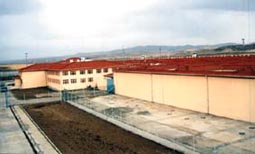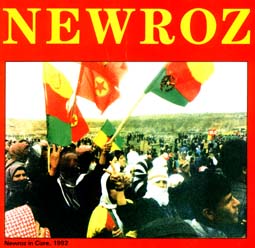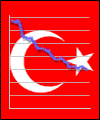13
March 2001
![]()
2. "Newroz is in European Human Rights Court", 8 persons who were tried in Diyarbakir State Security Court (SSC) on the grounds that they took part in Newroz celebrations last year, applied to European Human Rights Court (EHRC), stating that they had not received a fair trial.
3. "The death fast reaches its 145th day", Death fasts and hunger strikes undertaken by prisoners protesting the implementation of F-type prisons have now reached their 145th day. The fasts were launched by leftist prisoners, who also demanded the annulment of State Security Courts (DGMs), and requested the formation of a commission including doctors, lawyers, prisoners' relatives and representatives from nongovernmental organizations (NGOs) to inspect prisons.
4. "Expert documents torture and illegal executions in Iraq", Iraq's citizens face torture, detention and forced expulsion by their own government, as well as suffering caused by a decade of international sanctions, a United Nations human rights expert said in a report released Monday.
5. "Tehran-Moscow Cooperation Important for Stability and Security in Region", Iran's President Mohammad Khatami and his Russian counterpart Vladimir Putin on Monday started the first round of talks behind closed doors in Kremlin shortly after the arrival of President Khatami in Moscow.
6. "Economic crisis forces Turkey to improve its economic ties with neighbors", it seems that Turkey can only overcome the economic crisis by increasing its export to neighboring countries. Therefore, a group of Turkish businessmen flew to Iraq yesterday.
1. - Kurdish Observer - "Tension of circular in prisons":
Repression on prisons which have been intensified by the Circular
of February of Justice Ministry is continuing.
NEWS CENTER
Making a statement in the name of PKK captives in Bergama Special
Type Prison, Irfan Kalan and Vefa Kartal pointed out that their rights
were violated and repression was systematic. The statement stressed
that any and all needs from outside were banned and stoves, food ingredients
and all electronic goods were confiscated. The captives said that visits
were obstructed arbitrarily, adding "Our visitors are made to wait
for hours and threatened, the prison management is introducing new limitations
every day."
Families asked for sensitivity
On the other hand families of captives who had been moved to Sincan F-Type (isolation cells) from Ceyhan Prison and are now being on death fast are worrying. The families asked for public to be sensitive, saying that needs of their kids were not met.
Visiting media organizations in Adana, the families asked
for support. Kadriye Yildirim said that her two kids were on death fast,
and Ali Yildirim stated that his son could not see and hear, adding
that they were beaten on the grounds of greeting cards. Zeynep Karaagac,
on her part, asked for public to be sensitive, saying that her son was
now 40 kilos whereas he used to be 90 kilos. ![]()
2. - Ozgur Politika - "Newroz is in European Human
Rights Court":
8 persons who were tried in Diyarbakir State Security Court (SSC)
on the grounds that they took part in Newroz celebrations last year,
applied to European Human Rights Court (EHRC), stating that they had
not received a fair trial.
DIYARBAKIR
8 persons who were tried in Diyarbakir State Security Court (SSC)
on the grounds that they took part in Newroz celebrations last year,
applied to European Human Rights Court (EHRC), stating that they had
not received a fair trial.
Advocates Osman Baydemir, Cihan Aydin, Metin Kilavuz and Ejder Talay submitted an application to EHRC on behalf of their clients Kamuran Kabul, Mehmet Kartal, Dervis Algul, Haci Inan, Resit Atabey, Mehmet Ebuzeytoglu, Mehmet Baysal and Haci Inan who said they had not tried fairly.
Advocate Cihan Aydin stated that his clients were deprived
of their freedom in spite of there was no reason for them to be detained,
adding: "The applicants were not allowed to access to a legal consultant,
so the right to access to a legal consultant" which is guaranteed
3rd paragraph of article 6 of European Human Rights Agreement was violated."
![]()
3. - Turkish Daily News - "The death fast reaches
its 145th day":
IZMIR
Death fasts and hunger strikes undertaken by prisoners protesting the
implementation of F-type prisons have now reached their 145th day. The
fasts were launched by leftist prisoners, who also demanded the annulment
of State Security Courts (DGMs), and requested the formation of a commission
including doctors, lawyers, prisoners' relatives and representatives
from nongovernmental organizations (NGOs) to inspect prisons.
Following interference by security forces to end the death fasts and
hunger strikes on the 61st day, during which 37 inmates and two security
force members were killed, around 280 inmates have been continuing with
death fasts and around 800 inmates continue to hunger strike in Bakirkoy,
Gebze, Kartal, Ulucanlar, Usak, Buca, Eskisehir, Antakya, Nigde, Edirne
F-type, Tekirdag F-type, Kandira F-type and Sincan F-type prisons. Some
30 inmates who were wounded during the unrest resulting from the interference
of security forces, continue their death fasts and hunger strikes in
Cerrahpasa, Bayrampasa, Izmir Ataturk, Ankara State and Malatya Turgut
Ozal hospitals.
According to a report prepared by the Izmir Bar Association's Committee,
who are observing the death fasts and hunger strikes in prisons, the
health conditions of those inmates on death fasts are getting worse
day by day. According to the committee's report, some inmates have entered
a period in which the health problems will have lasting effects. They
said health problems like gastric bleeding, dizzying, thinning of the
skin, vomiting, hair loss and visual impairment were apparent on those
inmates who have passed over the medical death line.
The inmates, who are members of various leftist groups such as the Revolutionary
People's Liberation Party/Front (DHKP/C), the Turkish Communist Party
-- Marxists and Leninists (TKP-ML) and the Turkish Communist Workers'
Party (TKIP), had also applied at the beginning of the protest to the
Chamber of Doctors not to intervene with them even if they lose consciousness.
Izmir Chamber of Doctors Chairman Fatih Surenkok, talking to the Turkish
Daily News, said health conditions of the inmates on death fasts are
very bad: "They have been drinking water with sugar and salt and
taking Vitamin B1. However, they stopped taking the Vitamin B1 last
Wednesday. This will effectively cause their nervous system to collapse.
Some of them are already being forced to walk."
Stating that there was no similar situation in the world, Surenkok said:
"In the death fasts in Argentina, inmates reached 119 days of fasting.
However, in Turkey they have passed 144 days. We have never seen such
a situation. We don't know what keeps them alive. The Justice Ministry
should do something, because if they don't there could be deaths."
Izmir Bar Association Chairman Noyan Ozkan also said the Justice Minister
should remember what he promised. "The Justice Minister promised
not to implement the cell-based F-type prisons without first changing
Article 16 of the Anti-terrorism law, which states that inmates charged
with terrorism are to kept in F-type prisons and these inmates cannot
have contact with each other. The implementation of the F-type may be
legal in Turkey, but it does not suit the international agreements Turkey
has signed. The European Council also opposes the implementation of
a ward system, not the cell-based system," he said.
Ozkan said the Justice Minister should keep his promises, and if he
does this, relatives of the inmates in F-type prisons can apply to the
European Court of Human Rights. If they apply to the court, Turkey can
be fined. ![]()
4. - AP - "Expert documents torture and illegal
executions in Iraq":
GENEVA
Iraq's citizens face torture, detention and forced expulsion by their
own government, as well as suffering caused by a decade of international
sanctions, a United Nations human rights expert said in a report released
Monday.
Andreas Mavrommatis of Cyprus said in his 18-page report to the 53-nation
U.N. Human Rights Commission that he had received credible reports of
execution without trial, torture and arbitrary detention in Iraq.
Mavrommatis documented cases of harassment of religious minorities,
beatings, mass relocation of non-Arabs and laws being passed in secret.
One former prisoner interviewed by Mavrommatis described being given
electric shocks in his thumbs and being suspended by his hands from
a fan on the ceiling while he was beaten on the back.
An Iraqi army deserter, Masser Kazen Issa, said that when he was arrested,
he was given a general anesthetic and then both his ears were cut off.
Mavrommatis said he had reports that there were cemeteries in Iraq where
executed prisoners were buried in graves marked only with serial numbers,
and that the death penalty was sometimes suddenly imposed up to three
years after the trial.
He also had information that Qusai Saddam Hussein, son of the Iraqi
leader, had shot dead an Iraqi staff general in his office following
an argument. The body was returned to the family 45 days later.
Mavrommatis said he had submitted all his evidence to the Iraqi government
but had not yet received a reply. He did note that he had received fewer
new complaints this year than in past years.
Saad Hussain, counselor at the Iraqi mission in Geneva, said he could
not comment on the report as he had not seen it yet.
"We asked for a draft of this document and we have been waiting
to receive it. As soon as we do, we will make a comment and we will
address it at the commission," he said.
In the past, the Iraqi government has accused U.N. experts of being
too ready to believe claims by opposition groups with an ax to grind.
Mavrommatis also repeated his concerns about the effect that the decade-long
U.N. sanctions regime, imposed after Iraq invaded Kuwait in 1990 and
provoked the 1991 Gulf War, is having on the civilian population of
the country.
He said the carefully controlled U.N. oil-for-food program that allowed
Iraq to buy food and medicines was "a short-term response to the
now long-term dramatic situation of people who do not deserve the suffering
unintentionally inflicted on them."
The report will be considered during the commission, which opens its
six-week session next Monday. Last year, the commission -- the top U.N.
human rights body -- passed a resolution condemning President Saddam
Hussein's government for "all-pervasive repression and oppression."
Mavrommatis called on the Iraqi government to allow him to visit the
country. He has not been permitted to go to Iraq since he took office
at the beginning of last year, but he did meet dissidents in neighboring
Iran and also met Iraqi government officials in Geneva and New York.
![]()
5. - Tehran Times - "Tehran-Moscow Cooperation
Important for Stability and Security in Region ":
TEHRAN
Iran's President Mohammad Khatami and his Russian counterpart Vladimir
Putin on Monday started the first round of talks behind closed doors
in Kremlin shortly after the arrival of President Khatami in Moscow.
Khatami is the first Iranian head of state to visit Moscow in more than
four decades.
Khatami arrived in Moscow Monday for a four-day landmark state visit.
He was greeted at the airport by Russian Deputy Prime Minister Ilya
Klebanov. A red-carpet welcome was given to the Iranian president at
the Kremlin by his Russian counterpart.
Putin and Khatami signed a joint statement on Monday on the disputed
status of the oil-rich Caspian Sea, agreeing to delay discussion on
the subject.
"Until the legal regime of the Caspian Sea is finalized, the parties
do not officially acknowledge any boundaries on this sea," AFP
cited the statement.
"Any decision and agreements referring to the legal status and
use of the Caspian Sea will only have force if they are approved on
general consent of the five littoral states," the statement continued.
"The parties openly declare their disagreement to laying any trans-Caspian
oil and natural gas pipeline on the seabed. That would be dangerous
in the environmental sense in conditions of extreme geodesic activity."
Tehran is proposing an equal share-out among the five countries that
border the Caspian (Russia, Iran, Turkmenistan, Kazakhstan and Azerbaijan),
a view that Moscow opposes.
A five-nation summit due to have taken place in Turkmenistan on March
8 and 9 was postponed to next month at Iran's request, although officials
said the meeting could be delayed further still.
Iran's Oil Minister Bijan Namdar Zangeneh said Friday that Tehran was
not willing to wait for an agreement over the sea's legal status before
beginning its own exploration work.
An IRNA report quoted Iranian president as saying that Iran-Russia cooperation
will not be against a third country or the region rather is aimed at
guaranteeing stability and security at the regional and international
levels.
President Khatami said at the end of his talks with his Russian counterpart
Vladimir Putin that both Iran and Russia need development and progress
and the goal would be achieved only through security and stability.
Meanwhile, Putin said Tehran-Moscow cooperation serve as an important
factor for stability and security in the region. He said Iran-Russia
ties have entered a new phase and are growing.
At the end of the conference, the Iranian delegation and Russian officials,
including Foreign Minister Igor Ivanov, Minister of Defense Igor Sergeyev,
Minister of Atomic Energy Yevgeny Adamov, presidential advisor for Caspian
Sea affairs Viktor Kalyuzhny and Deputy Prime Minister Ilya Klebanov
entered talks. They are to sign an agreement on principles of mutual
cooperation at the end of the talks.
Another AFP report said that Putin on Monday announced Russia will continue
to sell arms to Iran, saying Tehran had the right to defend itself from
external attack.
Defying U.S. criticism of a Russian decision to develop military links
with Iran, Putin also accepted an invitation to visit Tehran, Interfax
news agency quoted Russian Foreign Minister Igor Ivanov as saying.
A date was not specified.
"Iran does not intend to arm itself with weapons which lie outside
the boundaries of international agreements, by which Russia abides,
and Russia does not intend to break its obligations," Putin said,
referring to weapons of mass destruction. ![]()
6. - Turkish Daily News - "Economic crisis forces
Turkey to improve its economic ties with neighbors":
It seems that Turkey can only overcome the economic crisis by increasing
its export to neighboring countries. Therefore, a group of Turkish businessmen
flew to Iraq yesterday
ANKARA
Since the Gulf War 10 years ago, Turkey has known that it had neighboring
countries to its south and southeast. Now Turkey has decided to improve
its political and economic ties with its neighbors that for so long
it has ignored. The goal of a group of Turkish businessmen's visit Iraq
is to develop economic ties, and plans for rail services between Syria-Turkey,
Turkey-Iran and Syria-Iran via Turkey have started after 10 years.
It seems that Turkey can only overcome the economic crisis by increasing
its export to neighboring countries. Therefore, the crisis should be
seen as an opportunity to improve ties with Iraq, Syria and Iran.
Despite Baghdad's complaints about Turkey letting American and British
warplanes bomb Iraq, a Turkish trade delegation of 400 people will visit
Iraq. The foreign trade delegation, headed by Foreign Trade Undersecretary
Kursad Tuzmen, flew to Iraq yesterday, aiming at developing economic
relations between the two countries. The visit is expected to last five
days.
Iraqi Industry Federation Chairman, Ihsan Abdurrazzak, previously stated
in the weekly Al Ittihad that the Turkish delegation's visit to Iraq
was very important in terms of developing trade between the two countries.
Iraqi industrialists want to improve economic ties with Turkey, Abdurrazzak
said before Tuzmen's visit, and another Turkish businessman delegation
of 50 people would visit Iraq as well.
Speaking before his departure to Baghdad, Tuzmen told the reporters
that Turkey had very low trade volume with its neighbors and they were
working to increase this volume.
"When we look at the U.S, it carries out 70 percent of its foreign
trade with its neighbors while in Germany its 80 percent. Foreign trade
between Turkey and its neighbors only constitutes 8 percent of Turkey's
foreign trade. So we once again should consider our trade with neighboring
countries," Tuzmen said.
Pointing out that Turkey was the country most affected by the Gulf War,
Tuzmen said Jordan's economy had increased five fold since the Gulf
War. He also added that the floating currency system would be a beneficiary
for Turkey's export.
Railway links resume between Syria-Turkey and Iran
In a related story, it has been reported that railway links between
Syria, Turkey and Iran has resumed after 10 years. Syria also stated
that it is planning to expand its railway network and hopes to have
rail links with Europe, Asia and the rest of the world.
Syrian Transportation Minister Makram Obeid spoke on Saturday in Aleppo,
some 350 km (220 miles) north of Damascus, after the inauguration of
the first direct train link between Syria and Iran via Turkey.
The minister said Syria planned to improve and expand its rail services,
building on last year's reopening of links with neighboring Turkey,
Iraq and Jordan.
"We are planning to expand our railway network and to have more
links with Europe, Asia and the rest of the world as part of a plan
to improve and expand the railway services," Obeid said.
The first Syrian train left Aleppo for Tehran on Saturday following
the arrival of the first train from Tehran, marking the opening of the
regular 60-hour weekly trip, covering 2,500 km through Syria, Turkey
and Iran.
The first Iranian train also reached the Turkish city of Van yesterday
by way of Damascus. ![]()